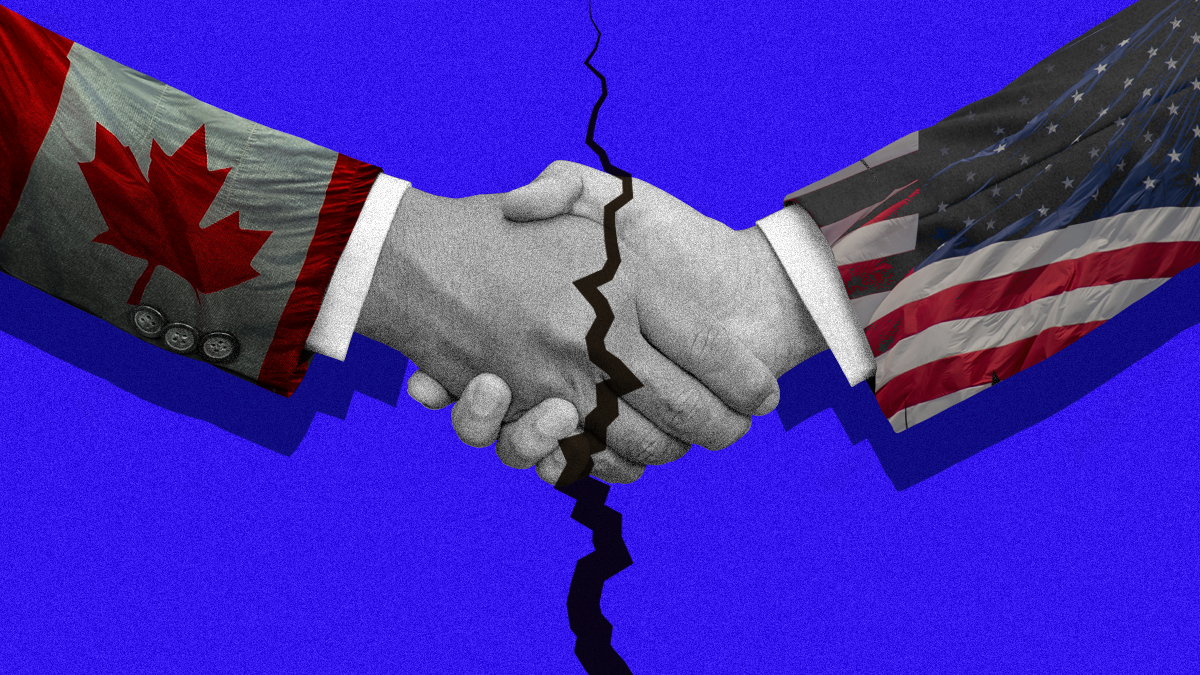Won’t you be my … frenemy?
It’s not a beautiful day in the North American neighborhood. Two days before the Feb. 1 deadline Donald Trump set to impose tariffs on Canada, Abacus Data and GZERO Media have an exclusive new poll on American attitudes toward their closest ally and neighbor. The upshot? This is the dawn of the new age of the political frenemy. Longtime American allies like Canada have reshaped their view of their largest trading partner into something much more threatening, going from friend to frenemy.
The Abacus Data-GZERO poll surveyed 1,500 Americans on politically radioactive issues like tariffs, fentanyl, and immigration. On the big one, tariffs, 47% of Trump voters support a 25% tariff on Canadian goods, while 67% of Democrats oppose it. Why the split? Republicans see it as a pain-free exercise. Only 19% of Trump voters believe tariffs on Canada will have a negative impact on them, as opposed to 65% of Democrat voters. “It’s striking how many Trump supporters appear unfazed by the impact of tariffs or Canadian retaliation,” says David Coletto, CEO of Abacus. “They may see it as cost-free now, but that blind spot could become a real liability if people start feeling the economic hit.”
Canadian officials have made an extraordinary effort to convince Americans that punishing Canada with high tariffs will drive up the cost of their goods, but it’s worked about as well as using winter boots to skate on ice. “Everything the American consumers buy from Canada is suddenly going to get a lot more expensive,” Prime Minister Justin Trudeau told CNN a few weeks ago, using examples like energy. “Canadian energy powers American manufacturing, businesses, and homes,” he said.
Clearly this has not landed with Trump voters, who not only see tariffs as a net benefit to Americans but also believe that Canadians are taking advantage of them. That’s right, even though the free trade deal was negotiated by Ronald Reagan and Trump, somehow crafty ol’ Canada pulled a fast one on both of them. According to the poll, 67% of Trump voters believe the free trade pact benefits Canada “way more” than it does the US. Overall, 50% of Americans believe there is a huge trade deficit between the US and Canada, which means that Americans are basically “subsidizing” their northern neighbor.
That’s not true, by the way. The trade deficit between the US and Canada is not $250 billion, as Trump repeats, but less than $100 billion, mainly because Canada supplies the US with 24% of its energy, at a discounted price.
On immigration, there is another consequential gap between perception and reality. Fifty-four percent of Trump voters think “millions of illegal immigrants” come from Canada (44% of Americans overall believe this). The reality? It’s about 1% of the total number of immigrants crossing illegally into the US. And Canada just spent another billion dollars to stop that amount in hopes of appeasing Trump into calling off the tariffs.
Finally, on the other tariff trigger point: drugs. Thirty-two percent of Americans believe that a lot of the fentanyl that comes into the US originates in Canada. There are drug labs in Canada, for sure, but they account for less than 1% of the fentanyl that comes from places like Mexico, China, and other countries.
You might think from all this that the US really doesn’t like Canada, but here is the weird part:87% of Americans have a positive or very positive view of Canada, according to the poll. An optimist might see the fact that less than half of Trump supporters want these tariffs as evidence that he doesn’t really have a mandate from his base. So what is it?
“These findings paint a portrait of an American public torn between long-standing goodwill toward Canada and the view that Canada may be getting the better end of existing trade deals,” says Coletto. “On one hand, most Americans describe Canada as an ally … On the other hand, more than half believe Canada benefits ‘way more’ from free trade, echoing President Trump’s narrative that tariffs are needed to level the playing field.”
The partisan difference is notable, but geography matters as well. “Americans in border states register deeper anxiety about the fallout from a potential trade war,” Coletto says. “This underlines the importance of these border communities: Their direct exposure to cross-border trade could serve as a bellwether for how the broader American public will ultimately judge the practicality and fairness of tariffs.”
All this leaves a massive challenge in a very short time: Canadian leaders need to somehow convince Americans — or, more concretely, President Trump — that high tariffs on Canada will hurt Americans.
“The more Canadians can demonstrate that these punitive measures undermine shared prosperity, the likelier they are to sway uncertain or moderate Americans and mitigate the worst outcomes of an escalating trade dispute,” says Coletto. “But we also have to be aware that Trump voters are captive to his rhetoric, and what they think and feel is likely all he cares about.”
This is what the age of the frenemy looks like. Won’t you be my neighbor?
___________
To see the full Abacus Data-GZERO poll and David Coletto’s deep dive into the numbers, please click here.
